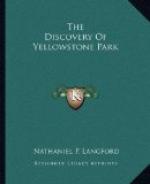At one point while they were seeking some sign of the trail made by the rest of the party, a huge grizzly bear dashed by them, frightening Hedges’ horse, which broke his bridle and ran away.
After supper Washburn and Hauser went up on the ridge back of the camp to reconnoiter and ran across a she grizzly and her two cubs. Being unarmed, they hastily returned to camp for their guns, and five or six of us joined them in a bear hunt. The members of this hunting party were all elated at the thought of bagging a fine grizzly, which seemed an easy prey. What could one grizzly do against six hunters when her instinctive duty would lead her to hurry her little ones to a place of safety!
While putting our guns in order and making other preparations for the attack, an animated discussion took place concerning a proper disposition of the two cubs which were to be captured alive. Some of our party thought that they ought to be carried home to Helena, but Bean and Reynolds, our packers, being appealed to, thought the plan not feasible unless they could be utilized as pack animals. When we reached the spot where Washburn and Hauser had last seen the bear, we traced her into a dense thicket, which, owing to the darkness, we did not care to penetrate, for not one of us felt that we had lost that particular bear. Jake Smith, with more of good sense than usual, but with his usual lack of scriptural accuracy, remarked, “I always considered Daniel a great fool to go into a den of bears."[Q]
Our journey for the entire day has been most trying, leading us through a trackless forest of pines encumbered on all sides by prostrate trunks of trees. The difficulty of urging forward our pack train, making choice of routes, extricating the horses when wedged between the trees, and re-adjusting the packs so that they would not project beyond the sides of the horses, required constant patience and untiring toil, and the struggle between our own docility and the obstacles in our way, not unfrequently resulted in fits of sullenness or explosions of wrath which bore no slight resemblance to the volcanic forces of the country itself.
[Illustration: Benj. Stickney]
On one of these occasions when we were in a vast net of down timber and brush, and each man was insisting upon his own particular mode of extrication, and when our tempers had been sorely tried and we were in the most unsocial of humors, speaking only in half angry expletives, I recalled that beautiful line in Byron’s “Childe Harold,” “There is a pleasure in the pathless woods,” which I recited with all the “ore rotundo” I could command, which struck the ludicrous vein of the company and produced an instantaneous response of uproarious laughter, which, so sudden is the transition between extremes, had the effect to restore harmony and sociability, and, in fact, to create a pleasure in the pathless wilderness we were traveling.




